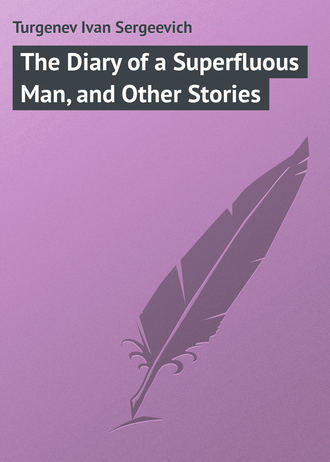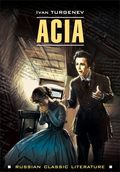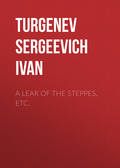
Иван Тургенев
The Diary of a Superfluous Man, and Other Stories
"But that cannot be!.. I …"
"Eh, master! there 's no end of talking with you, apparently," – retorted the old man with vexation. – "Whew, how cold it is! Good-bye."
"Stay, stay … here 's something for thee…" And I held out to him a quarter of a ruble which I had prepared beforehand; but my hand came into contact with the swiftly banged wicket-gate. The silver coin fell to the ground, rolled away, and lay at my feet.
"Ah, thou old rascal!" – I thought – "Don Quixote de La Mancha! Evidently, thou hast received orders to hold thy tongue… But wait, thou shalt not trick me."…
I promised myself that I would elucidate the matter, at any cost. For about half an hour I paced to and fro, without knowing what decision to adopt. At last I made up my mind first to inquire in the village, precisely who had arrived at the manor, and who she was, then to return, and, as the saying runs, not desist until the matter was cleared up. – And if the Unknown should come out of the house, I would, at last, see her by daylight, near at hand, like a living woman, not like a vision.
It was about a verst to the village, and I immediately betook myself thither, stepping out lightly and alertly: a strange audacity was seething and sparkling in my blood; the invigorating freshness of the morning excited me after the uneasy night. – In the village I learned from two peasants, who were on their way to their work, everything which I could learn from them; namely: I learned that the manor, together with the village which I had entered, was called Mikhaílovskoe, that it belonged to the widow of a Major, Anna Feódorovna Shlýkoff; that she had with her her sister, an unmarried woman, Pelagéya Feódorovna Badáeff by name; that both of them were advanced in years, were wealthy, hardly ever lived at home, were always travelling about, kept no one in attendance on them except two female domestic serfs and a male cook; that Anna Feódorovna had recently returned from Moscow with no one but her sister… This last circumstance greatly perturbed me: it was impossible to assume that the peasants also had been commanded to hold their peace about my Unknown. But it was utterly impossible to concede that Anna Feódorovna Shlýkoff, a widow of five-and-forty, and that young, charming woman, whom I had seen on the previous evening, were one and the same person. Pelagéya Feódorovna, judging from the description, was not distinguished for her beauty either, and, in addition to that, at the mere thought that the woman whom I had seen at Sorrento could bear the name of Pelagéya, and still more of Badáeff, I shrugged my shoulders and laughed maliciously. And nevertheless, I had beheld her the night before in that house… I had beheld her, beheld her with my own eyes, I reflected. Irritated, enraged, but still more inclined to stand by my intention, I would have liked to return at once to the manor … but glanced at my watch; it was not yet six o'clock. I decided to wait a while. Every one was still asleep at the farm, in all probability … and to prowl about the house at such an hour would only serve to arouse unnecessary suspicion; and besides, in front of me stretched bushes, and beyond them an aspen wood was visible…
I must do myself the justice to say, that, notwithstanding the thoughts which were exciting me, the noble passion for the hunt had not yet grown wholly mute within me; "perchance," I thought, – "I shall hit upon a covey, – and that will serve to pass away the time." I entered the bushes. But, truth to tell, I walked in a very careless way, quite out of consonance with the rules of the art: I did not follow my dog constantly with my eyes, I did not snort over a thick bush, in the hope that a red-browed black snipe would fly thence with a whirr and a crash, but kept incessantly looking at my watch, which never serves any purpose whatsoever. And, at last, it was going on nine. – "'T is time!" I exclaimed aloud, and was on the point of turning back to the manor, when suddenly a huge black woodcock actually did begin to flutter out of the thick grass a couple of paces from me. I fired at the magnificent bird, and wounded it under the wing; it almost fell to the ground, but recovered itself, started off, fluttering its wings swiftly and, diving toward the wood, tried to soar above the first aspens on the edge, but its strength failed, and it rolled headlong into the thicket. It would have been utterly unpardonable to abandon such a prize. I strode briskly after it, entered the forest, made a sign to Dianka, and a few moments later I heard a feeble clucking and flapping; it was the unlucky woodcock, struggling under the paws of my quick-scented hound. I picked it up, put it in my game-bag, glanced round, and – remained rooted to the spot, as it were…
The forest which I had entered was very dense and wild, so that I had with difficulty made my way to the spot where the bird had fallen; but at a short distance from me wound a cart-road, and along this road were riding on horseback my beauty and the man who had overtaken me on the night before; I recognised him by his moustache. They were riding softly, in silence, holding each other by the hand; their horses were barely putting one foot before the other, lazily swaying from side to side and handsomely stretching out their long necks. When I had recovered from my first alarm … precisely that, alarm: I can give no other appellation to the feeling which suddenly seized upon me… I fairly bored into her with my eyes. How beautiful she was! how enchantingly her graceful form moved toward me amid the emerald green! Soft shadows, tender reflections glided over her – over her long grey habit, over her slender, slightly-bent neck, over her faintly-rosy face, over her glossy black hair, which escaped luxuriantly from under her low-crowned hat. But how shall I transmit that expression of utter, passionate bliss of a person passionate to the point of speechlessness, which breathed forth from her features? Her head seemed to be bending beneath the burden of it; moist, golden sparks glittered in her dark eyes, which were half-concealed by her eyelashes; they gazed nowhere, those happy eyes, and the slender brows drooped over them. An irresolute, child-like smile – the smile of profound happiness, strayed over her lips; it seemed as though excess of happiness had wearied and even broken her a little, as a flower in full bloom sometimes breaks its own stem. Both her hands lay powerless: one, in the hand of the man who was riding by her side, the other on her horse's mane.
I succeeded in getting a good look at her – and at him also… He was a handsome, stately man, with an un-Russian face. He was gazing at her boldly and merrily, and, so far as I was able to observe, was admiring her not without secret pride. He was admiring her, the villain, and was very well-satisfied with himself, and not sufficiently touched, not sufficiently moved, – precisely that, moved… And, as a matter of fact, what man does deserve such devotion, what soul, even the most beautiful, is worthy of furnishing another soul such happiness? I must say, that I was envious of him!.. In the meantime, they had both arrived on a level with me … my dog suddenly bounded out into the road and began to bark. My Unknown started, cast a swift glance around and, catching sight of me, dealt her steed a violent blow on the neck with her whip. The horse snorted, reared up on his hind legs, threw both his hoofs forward simultaneously, and dashed off at a gallop… The man immediately gave the spur to his black horse, and when I emerged by the road into the border of the forest a few moments later, both of them were already galloping off into the golden distance, across the fields, rising smartly and regularly in their saddles … and were not galloping in the direction of the farm…
I gazed… They speedily disappeared behind a hillock, brilliantly illuminated for the last time by the sun against the dark line of the horizon. I stood, and stood, then returned with slow steps to the forest and sat down on the path, covering my eyes with my hand. – I have observed that after meeting strangers, all that is necessary is to close the eyes – and their features immediately start up before you; any one can verify my observation on the street. The more familiar the faces, the more difficult is it for them to present themselves, the more indefinite is their impression; you recall them, but you do not see them… and you can never possibly picture to yourself your own face… The very minutest separate feature is known to you, but the entire image will not constitute itself. So then, I sat down, closed my eyes – and immediately beheld the Unknown and her companion, and their horses, and everything… The man's smiling countenance stood before me with particular sharpness and distinctness. I began to stare intently at it … it became confused, and dissolved into a sort of crimson mist, and after it, her image also floated away and sank, and would not return.
"Well, never mind!" – I thought; – "at all events, I have seen them, seen them both clearly… It remains for me now to find out their names." Endeavour to find out their names! What ill-judged, petty curiosity! But I swear that it was not curiosity which had flamed up in me. In truth, it simply seemed to me impossible not to discover, eventually, who they were, after accident had so strangely and so persistently brought us together. Moreover, my former impatient perplexity no longer existed; it had been replaced by a certain confused, sorrowful feeling, of which I was somewhat ashamed… I was jealous…
I did not hasten back to the farm. I must confess that I had become ashamed to pry into the secrets of others. Moreover, the appearance of the fond pair by daylight, in the light of the sun, although it was unexpected and, I repeat, strange, had not exactly soothed, but chilled me. I no longer found anything supernatural, miraculous in this occurrence … nothing resembling an impossible dream…
I began to hunt again with greater assiduity than before; but still, there were no genuine raptures. I hit upon a covey, which engaged my attention for an hour and a half… The young partridges did not respond to my whistle for a long time, – probably because I did not whistle with sufficient "objectivity." – The sun had already risen quite high (my watch indicated twelve o'clock), when I directed my steps toward the manor. I walked without haste. Yonder, at last, the low-roofed little house peeped forth from its hill. I approached … and not without secret satisfaction beheld Lukyánitch. As of yore, he was sitting motionless on the bench in front of the wing. The gate was closed – also the shutters.
"Good morning, uncle!" – I shouted to him from afar. – "Hast thou come out to warm thyself?"
Lukyánitch turned his gaunt face toward me and silently doffed his cap.
I went up to him.
"Good morning, uncle, good morning," – I repeated, wishing to encourage him. – "Why," – I added, unexpectedly descrying my quarterruble on the ground, – "didst not thou see it?"
And I pointed out to him the silver circle, half peeping from beneath the short grass.
"Yes, I saw it."
"Then why didst thou not pick it up?"
"Because it was n't my money, so I did n't pick it up."
"What a fellow thou art, brother!" – I returned, not without embarrassment, and picking up the coin, I offered it to him again. – "Take it, take it, for tea."
"Much obliged," – Lukyánitch answered me, with a composed smile. – "It is n't necessary; I 'll manage to pull through without it. Much obliged."
"But I am ready to give you still more, with pleasure!" – I replied in confusion.
"What for? Please don't disturb yourself – much obliged for your good-will, but we still have a crust of bread. And perhaps we sha'n't eat that up – that 's as it may happen."
And he rose, and put out his hand to the wicket-gate.
"Stay, stay, old man," – I began, almost in desperation; – "how uncommunicative thou art to-day, really… Tell me, at least, has your mistress risen yet?"
"She has."
"And … is she at home?"
"No, she 's not at home."
"Has she gone off on a visit, pray?"
"No, sir; she has gone to Moscow."
"To Moscow! How is that? Why, she was here this morning!"
"She was."
"And she passed the night here?"
"She did."
"And she came hither recently?"
"Yes."
"What next, my good man?"
"Why, this: it must be about an hour since she deigned to start back to Moscow."
"To Moscow!"
I stared in petrification at Lukyánitch; I had not expected this, I admit.
Lukyánitch stared at me… A crafty, senile smile distended his withered lips and almost beamed in his melancholy eyes.
"And did she go away with her sister?" – I said at last.
"Yes."
"So that now there is no one in the house?"
"No one…"
"This old man is deceiving me," – flashed through my head. – "'T is not without cause that he is grinning so craftily. – Listen, Lukyánitch," – I said aloud; – "dost wish to do me one favour?"
"What is it you wish?" – he enunciated slowly, evidently beginning to feel annoyed by my questions.
"Thou sayest that there is no one in the house; canst thou show it to me? I should be very grateful to thee."
"That is, you want to inspect the rooms?"
"Yes, the rooms."
Lukyánitch remained silent for a space.
"Very well," – he said at last. – "Pray, enter…"
And bending down, he stepped across the threshold of the wicket-gate. I followed him. After traversing a tiny courtyard, we ascended the tottering steps of the porch. The old man gave the door a push; there was no lock on it: a cord with a knot stuck out through the key-hole… We entered the house. It consisted in all of five or six low-ceiled rooms, and, so far as I could make out in the faint light, which streamed sparsely through the rifts in the shutters, the furniture in these rooms was extremely plain and decrepit. In one of them (namely, in the one which opened on the garden) stood a small, antiquated piano… I raised its warped lid and struck the keys: a shrill, hissing sound rang out and died feebly away, as though complaining of my audacity. It was impossible to discern from anything that people had recently left the house; it had a dead and stifling sort of smell – the odour of an uninhabited dwelling; here and there, indeed, a discarded paper gave one to understand, by its whiteness, that it had been dropped there recently. I picked up one such bit of paper; it proved to be a scrap of a letter; on one side in a dashing feminine handwriting were scrawled the words "se taire?" on the other I made out the word "bonheur."… On a small round table near the window stood a nosegay of half-faded flowers in a glass, and a green, rumpled ribbon was lying there also … I took that ribbon as a souvenir. – Lukyánitch opened a narrow door, pasted over with wall-paper.
"Here," – said he, extending his hand: – "this here is the bedroom, and yonder, beyond it, is the room for the maids, and there are no other chambers…"
We returned by way of the corridor. – "And what room is that yonder?" – I asked, pointing at a broad, white door with a lock.
"That?" – Lukyánitch answered me, in a dull voice. – "That 's nothing."
"How so?"
"Because… 'T is a store-room…" And he started to go into the anteroom.
"A store-room? Cannot I look at it?"…
"What makes you want to do that, master, really?!" – replied Lukyánitch with displeasure. – "What is there for you to look at? Chests, old crockery … 't is a store-room, and nothing more…"
"All the same, show it to me, please, old man," – I said, although I was inwardly ashamed of my indecent persistence. – "I should like, you see … I should like to have just such a house myself at home, in my village …"
I was ashamed: I could not complete the sentence I had begun.
Lukyánitch stood with his grey head bent on his breast, and stared at me askance in a strange sort of way.
"Show it," – I said.
"Well, as you like," – he replied at last, got the key, and reluctantly opened the door.
I glanced into the store-room. There really was nothing noteworthy about it. On the walls hung old portraits with gloomy, almost black countenances, and vicious eyes. The floor was strewn with all sorts of rubbish.
"Well, have you seen all you want?" – asked Lukyánitch, gruffly.
"Yes; thanks!" – I hastily replied.
He slammed to the door. I went out into the anteroom, and from the anteroom into the courtyard.
Lukyánitch escorted me, muttering: "Good-bye, sir!" and went off to his own wing.
"But who was the lady visitor at your house last night?" – I called after him: – "I met her this morning in the grove."
I had hoped to daze him with my sudden question, to evoke a thoughtless answer. But the old man merely laughed dully, and slammed the door behind him when he went in.
I retraced my steps to Glínnoe. I felt awkward, like a boy who has been put to shame.
"No," – I said to myself: – "evidently, I shall not obtain a solution to this puzzle. I 'll give it up! I will think no more of all this."
An hour later, I set out on my homeward drive, enraged and irritated.
A week elapsed. Try as I might to banish from me the memory of the Unknown, of her companion, of my meetings with them, – it kept constantly returning, and besieged me with all the importunate persistence of an after-dinner fly… Lukyánitch, with his mysterious looks and reserved speeches, with his coldly-mournful smile, also recurred incessantly to my memory. The house itself, when I thought of it, – that house itself gazed at me cunningly and stupidly through its half-closed shutters, and seemed to be jeering at me, as though it were saying to me: "And all the same thou shalt not find out anything!" At last I could endure it no longer, and one fine day I drove to Glínnoe, and from Glínnoe set out on foot … whither? The reader can easily divine.
I must confess that, as I approached the mysterious manor, I felt a decidedly violent agitation. The exterior of the house had not undergone the slightest change: the same closed windows, the same melancholy and desolate aspect; only, on the bench, in front of the wing, instead of old Lukyánitch, sat some young house-serf or other, of twenty, in a long nankeen kaftan and a red shirt. He was sitting with his curly head resting on his palm, and dozing, swaying to and fro from time to time, and quivering.
"Good morning, brother!" – I said in a loud voice.
He immediately sprang to his feet and stared at me with widely-opened, panic-stricken eyes.
"Good morning, brother!" – I repeated: – "And where is the old man?"
"What old man?" – said the young fellow, slowly.
"Lukyánitch."
"Ah, Lukyánitch!" – He darted a glance aside. – "Do you want Lukyánitch?"
"Yes, I do. Is he at home?"
"N-no," – enunciated the young fellow, brokenly, – "he, you know … how shall I … tell … you … about … that …"
"Is he ill?"
"No."
"What then?"
"Why, he is n't here at all."
"Why not?"
"Because. Something … unpleasant … happened to him."
"Is he dead?" – I inquired with surprise.
"He strangled himself."
"Strangled himself!" – I exclaimed in affright, and clasped my hands.
We both gazed in each other's eyes in silence.
"How long ago?" – I said at last.
"Why, to-day is the fifth day since. They buried him yesterday."
"But why did he strangle himself?"
"The Lord knows. He was a freeman, on wages; he did not know want, the masters petted him as though he were a relation. For we have such good masters – may God give them health! I simply can't understand what came over him. Evidently, the Evil One entrapped him."
"But how did he do it?"
"Why, so. He took and strangled himself."
"And nothing of the sort had been previously noticed in him?"
"How shall I tell you… There was nothing … particular. He was always a very melancholy man. He used to groan, and groan. 'I 'm so bored,' he would say. Well, and then there was his age. Of late, he really did begin to meditate something. He used to come to us in the village; for I 'm his nephew. – 'Well, Vásya, my lad,' he would say, 'prithee, brother, come and spend the night with me!' – 'What for, uncle?' – 'Why, because I 'm frightened, somehow; 't is tiresome alone.' Well, and so I 'd go to him. He would come out into the courtyard and stare and stare so at the house, and shake and shake his head, and how he would sigh!.. Just before that night, that is to say, the one on which he put an end to his life, he came to us again, and invited me. Well, and so I went. When we reached his wing, he sat for a while on the bench; then he rose, and went out. I wait, and 'he 's rather long in coming back' – says I, and went out into the courtyard, and shouted, 'Uncle! hey, uncle!' My uncle did not call back. Thinks I: 'Whither can he have gone? surely, not into the house?' and I went into the house. Twilight was already drawing on. And as I was passing the store-room, I heard something scratching there, behind the door; so I took and opened the door. Behold, there he sat doubled up under the window.
"'What art thou doing there, uncle?' says I. But he turns round, and how he shouts at me, and his eyes are so keen, so keen, they fairly blaze, like a cat's.
"'What dost thou want? Dost not see – I am shaving myself.' And his voice was so hoarse. My hair suddenly rose upright, and I don't know why I got frightened … evidently, about that time the devils had already assailed him.
"'What, in the dark?' – says I, and my knees fairly shook.
"'Come,' says he, 'it 's all right, begone!'
"I went, and he came out of the store-room and locked the door. So we went back to the wing, and the terror immediately left me.
"'What wast thou doing in the store-room, uncle?' says I. – He was fairly frightened.
"'Hold thy tongue!' says he; 'hold thy tongue!' and he crawled up on the oven-bench.
"'Well,' thinks I to myself, – ''t will be better for me not to speak to him; he surely must be feeling ill to-day.' So I went and lay down on the oven-bench myself, too. And a night-light was burning in a corner. So, I am lying there, and just dozing, you know … when suddenly I hear the door creaking softly … and it opens – so, a little. And my uncle was lying with his back to the door, and, as you may remember, he was always a little hard of hearing. But this time he sprang up suddenly…
"'Who 's calling me, hey? who is it? hast come for me, for me?!' and out he ran into the yard without his hat…
"I thought: 'What 's the matter with him?' and, sinful man that I am, I fell asleep immediately. The next morning I woke up … and Lukyánitch was not there.
"I went out of doors and began to call him – he was nowhere. I asked the watchman:
"'Has n't my uncle come out?' says I.
"'No,' says he, 'I have n't seen him.'…
"'Has n't something happened to him, brother?'… says I…
"'Oï!'… We were both fairly frightened.
"'Come, Feodósyeitch,' says I, 'come on,' says I, – 'let 's see whether he is n't in the house.'
"'Come on,' – says he, 'Vasíly Timofyéitch!' but he himself was as white as clay.
"We entered the house… I was about to pass the store-room, but I glanced and the padlock was hanging open on the hasp, and I pushed the door, but the door was fastened inside… Feodósyeitch immediately ran round, and peeped in at the window.
"'Vasíly Timofyéitch!' he cries; – 'his legs are hanging, his legs …'
"I ran to the window. And they were his legs, Lukyánitch's legs. And he had hanged himself in the middle of the room. – Well, we sent for the judge… They took him down from the rope; the rope was tied with twelve knots."
"Well, what did the court say?"
"What did the court say? Nothing. They pondered and pondered what the cause might be. There was no cause. And so they decided that he must have been out of his mind. His head had been aching of late, he had been complaining very frequently of his head…"
I chatted for about half an hour longer with the young fellow, and went away, at last, completely disconcerted. I must confess that I could not look at that rickety house without a secret, superstitious terror… A month later I quitted my country-seat, and little by little all these horrors, these mysterious encounters, vanished from my mind.






